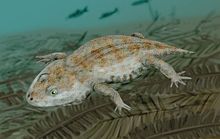Amphibamus is a genus of amphibamid temnospondyl amphibians from the Carboniferous (middle Pennsylvanian) of North America.[1][2][3] This animal is considered to have been close to the ancestry of modern amphibians. Its length was about 20 centimetres (7.9 in).[4]
| Amphibamus Temporal range:
| |
|---|---|

| |
| Amphibamus grandiceps | |
| Scientific classification | |
| Domain: | Eukaryota |
| Kingdom: | Animalia |
| Phylum: | Chordata |
| Order: | †Temnospondyli |
| Family: | †Amphibamidae |
| Genus: | †Amphibamus Cope, 1865 |
| Species: | †A. grandiceps
|
| Binomial name | |
| †Amphibamus grandiceps Cope, 1865
| |
The generic name Amphibamus alludes to the two modes of locomotion of the animal, swimming with its oar-shaped tail, and crawling because of its long fingers with claws,[5] from Greek ἀμφί (amphí) "both" and -βάμων (-bámōn) "that goes" or βᾶμα (bâma) "leg".
Gallery
edit-
Amphibamus grandiceps skeleton
-
Amphibamus grandiceps fossil
References
edit- ^ Gaining Ground: The Origin and Early Evolution of Tetrapods by Jennifer A. Clack
- ^ Vertebrate Palaeontology by Michael J. Benton
- ^ The Book of Life: An Illustrated History of the Evolution of Life on Earth, Second Edition by Stephen Jay Gould
- ^ Temnospondyli
- ^ Cope, Edward (1865). "On Amphibamus Grandiceps, a New Batrachian from the Coal Measures". Proceedings of the Academy of Natural Sciences of Philadelphia. 17 (3): 134–137. Retrieved October 29, 2023.